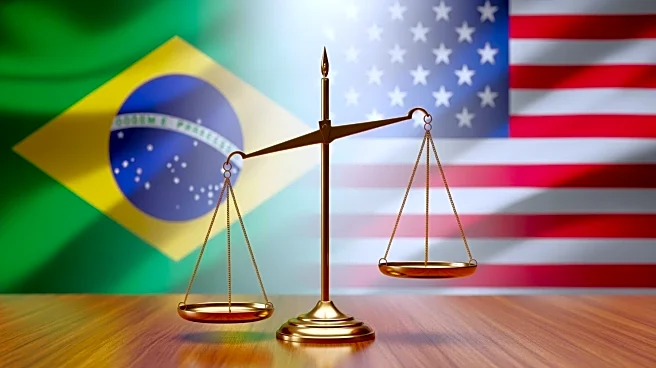What's Happening?
Brazil's President Luiz Inacio Lula da Silva announced that Brazil and the United States will engage in immediate discussions to address tariffs and sanctions imposed by the U.S. on Brazilian officials.
The tariffs, linked by President Trump to a 'witch hunt' against former Brazilian President Jair Bolsonaro, have impacted trade dynamics, particularly in the beef industry. The U.S. sanctions include measures against Brazilian Supreme Court Justice Alexandre de Moraes, who was involved in Bolsonaro's conviction for attempting a coup. Lula criticized the tariff increase, citing a significant U.S. trade surplus with Brazil over the past 15 years. Brazil's Foreign Minister Mauro Vieira confirmed that negotiations will commence immediately, with a meeting scheduled with the U.S. delegation. Brazil has requested the suspension of tariffs during the negotiation process, although it is unclear if the U.S. has agreed to this request.
Why It's Important?
The tariff dispute between Brazil and the U.S. has significant implications for global trade, particularly in the beef industry. Higher U.S. tariffs on Brazilian goods have led to increased prices in the U.S. and have encouraged trade triangulation through countries like Mexico. This situation highlights the interconnected nature of global trade and the potential for tariffs to reshape market dynamics. Resolving these disputes could stabilize prices and improve trade relations between the two countries. Additionally, the sanctions against Brazilian officials underscore the political tensions that can arise from international trade policies, affecting diplomatic relations and economic strategies.
What's Next?
Negotiations between Brazil and the U.S. are set to begin immediately, with both countries aiming to establish a schedule and identify sectors for discussion. Brazil hopes to conclude bilateral negotiations addressing the current American tariffs on Brazilian goods within a few weeks. The outcome of these talks could lead to adjustments in trade policies and potentially lift the tariffs, impacting prices and trade flows. Stakeholders in the beef industry and other affected sectors will be closely monitoring the progress of these negotiations, as their outcomes could have significant economic implications.
Beyond the Headlines
The tariff dispute also raises questions about the broader impact of trade policies on international relations and domestic politics. The sanctions against Brazilian officials reflect the complex interplay between legal actions and diplomatic strategies. This situation may influence how countries approach trade negotiations and sanctions in the future, considering both economic and political factors. The resolution of this dispute could set a precedent for handling similar issues in other international contexts.









